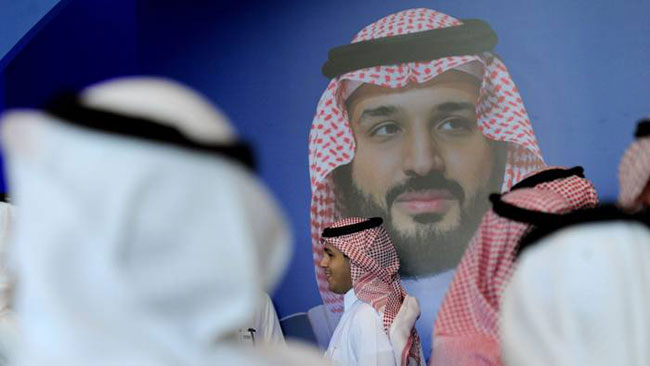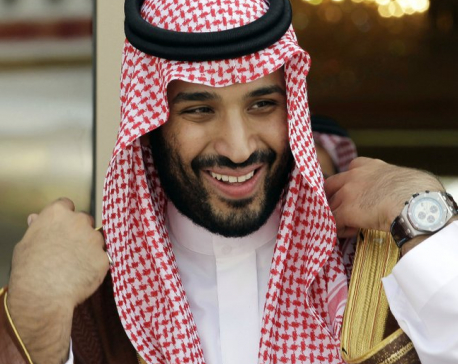
OR
More from Author
The 5,000 or so third-generation Saudi princes and their entourage consume $30-50 billion per year
NEW YORK – Most efforts to comprehend the dynamics of Saudi Arabia’s ongoing political earthquake have focused on the psychology of the young crown prince, Mohammed bin Salman. But there are also structural reasons for Prince Mohammed’s brand of populism. Understanding these factors is key to finding a better path forward.
In the past, political stability in Saudi Arabia rested on three separate deals: within the royal family; between the royal family and the Kingdom’s traditional elites; and between the state and the population.
The deal within the Al Saud family is rooted in asabiyya—the ability of an ambitious tribe to stick together to monopolize power. But the royal family has grown too large and become too divided to justify the cost of maintaining its unity. Loosely estimated, the 5,000 or so third-generation princes and their entourage consume US $30-50 billion per year.
The deal among traditional elites is also rooted in the Kingdom’s genesis. These notable families were encouraged to accumulate economic power. Privileged access to government contracts, subsidies, capital, protection from competition, and the ability to import labor freely have embedded their companies deeply in the economy.
This protected elite private sector grew to represent over 50 percent of Saudi GDP. But, because it is largely staffed by expats, it generates no trickle-down benefits to the local population, only negative externalities.
The population, meanwhile, was offered economic security in exchange for loyalty—an arrangement institutionalized through a patronage network of high-paying public-sector jobs and a broad array of generous welfare benefits and consumer subsidies. As a result, more than 75 percent of Saudi citizens work for the state, and much of the rest of the public budget is spent on cradle-to-grave social support.
Where’s the money?
But with per capita revenue from oil exports now only $5,000 a year for Saudi Arabia’s 20 million nationals, the system has become too costly. The challenge for Prince Mohammed is to oversee a transition to a less expensive political order, while generating sufficient economic efficiency gains to prevent the necessary adjustment from fueling instability and civil unrest.

Other autocratic regimes in the region, with larger populations and less oil—such as Iraq, Egypt, Algeria, and Syria—followed a “republican strategy” that appeased the poor with various forms of patronage, and repressed economic elites. This blocked the rise of any credible opposition, at the cost of entrenching an anemic, largely informal, and consumption-based economy.
Such a Venezuela-style approach could appeal to Prince Mohammed, because its populist fervor aligns with his purges of elites and neutralization of any serious opposition. Foreign and state-controlled firms could replace the notables in delivering necessary private services. And the balance of payments could be stabilized with lower consumption and imports, particularly that of the royals and the rich.
The problem with this approach is that it would only delay the essential challenge of raising labor productivity. While other autocrats under pressure—such as Turkey’s Recep Tayyip Erdoğan and Russia’s Vladimir Putin—are increasingly choosing this myopic route of sacrificing the private sector on the altar of regime survival, the Kingdom can do better, given the assets at its disposal.
The alternative of an authoritarian ruling coalition of traditional elites is even less attractive to Saudi Arabia’s current rulers, as it would entail lower levels of consumption for ordinary people—and thus, in all likelihood, higher levels of repression. Domestic strife is the last thing the crown prince needs.
Enlarging economic pie
A better way forward requires more balance and better coordination. The pain of adjustment should be shared more widely among all groups, and reforms should focus much more on enlarging the economic pie.
This route is feasible, thanks to Saudi Arabia’s abundance of low-hanging fruit: a youthful society clamoring for social emancipation, better-educated women yearning for more participation, and millions of jobs created for expats available for nationals to fill.
What clouds this scenario is the low productivity of the elite private sector. To break free of its middle-income trap, Saudi Arabia needs to democratize, if not its politics, then at least its markets, through greater reliance on the rule of law and fair competition. Viewed from this perspective, Prince Mohammed’s current anti-corruption campaign will need to be followed by efforts to establish more inclusive rules for the private sector.
If the Kingdom’s private sector can be made to work, the economic challenge becomes modest. About 200,000 young people enter the labor market every year. If as many jobs are needed to allow women to join and to slowly wind down the public sector, two million new jobs would be needed over the next five years. To put this in perspective, there are now nine million foreign workers employed in the Kingdom.
Rather than new mega-investments in high tech, the difficult route of Saudization, initiated a decade ago, can gradually do the job, if augmented by greater support for competition and for small and medium-size enterprises. But the starting point is challenging, because public servants currently earn three times more than private-sector workers. To unify the labor market, a medium-term goal could be to reduce Saudi workers’ pay by a third, increase their productivity by a third, and subsidize the rest from state coffers.
The populist temptation promises at best an authoritarian, middle-income welfare state. Saudi Arabia would be better served by a strategy of economic and social inclusion that broadens the basis of political support by convincing all influential groups—royals, notables, and mere mortals—to view their short-term losses as an investment in the Kingdom’s future.
The author is a visiting professor at Columbia University’s School of
International and Public Affairs
© 2017, Project Syndicate
www.project-syndicate.org
You May Like This

Saudi Arabia to show all World Cup matches illegally
A diplomatic row means Saudi Arabia will be pirating all 64 matches of the World Cup after banning the sports channel in... Read More...

Saudi king upends royal succession, names son as 1st heir
RIYADH, June 21: Saudi Arabia’s King Salman on Wednesday appointed his 31-year-old son Mohammed bin Salman as crown prince, placing... Read More...

Arrested Saudi Arabian man is from Sudan
KATHMANDU, Aug 13: Metropolitan Police Circle Office, Lainchaur on Friday said that the Saudi Arabian man arrested on charge of... Read More...




Just In
- Nepal faces Hong Kong today for ACC Emerging Teams Asia Cup
- 286 new industries registered in Nepal in first nine months of current FY, attracting Rs 165 billion investment
- UML's National Convention Representatives Council meeting today
- Gandaki Province CM assigns ministerial portfolios to Hari Bahadur Chuman and Deepak Manange
- 352 climbers obtain permits to ascend Mount Everest this season
- 16 candidates shortlisted for CEO position at Nepal Tourism Board
- WB to take financial management lead for proposed Upper Arun Project
- Power supply to be affected in parts of Kathmandu Valley today as NEA expedites repair works







_20220508065243.jpg)








Leave A Comment